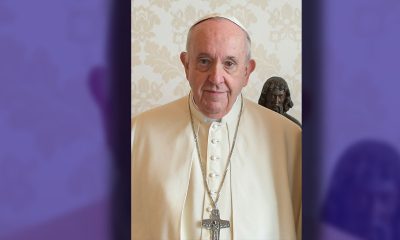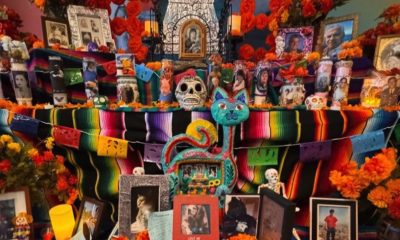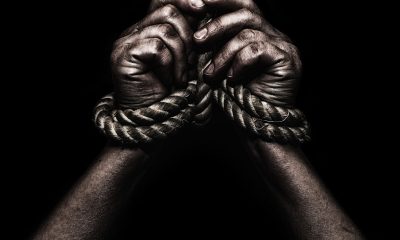Religion
Pope to Visit Notoriously Violent Bolivia Prison in SA Trip

Pope Francis gives his speech in the Synod hall on the occasion of the closing ceremony of the IV Scholas Occurrentes World Educational Congress, at the Vatican, Thursday, Feb. 5, 2015. (AP Photo/Gregorio Borgia)
NICOLE WINFIELD, Associated Press
VATICAN CITY (AP) — Pope Francis will visit a notoriously violent prison in Bolivia, a flood-prone shanty town in Paraguay and a home for the elderly in Ecuador during his July 5-12 visit to South America.
The Vatican on Friday released the itinerary for Francis’ second visit to his home continent, a three-nation whirlwind tour featuring 22 speeches that will likely focus on some of the key concerns of his pontificate.
He will meet with heads of state and religious leaders of each country, and participate in a world meeting of popular movements in Bolivia.
When Francis met with the grassroots groups last year at the Vatican, he delivered an off-the-cuff, mini-encyclical on the rights of the poor, the injustices of unemployment, and the need for environmental protection — issues he’ll likely raise again on his home turf.
Francis arrives in Quito, Ecuador on July 5 and the following day flies to Guayaquil to celebrate Mass and meet with the community of his Jesuit order. He’ll meet with students, priests and residents at a home for the elderly in Ecuador before flying to La Paz, Bolivia.
He’ll spend only a few hours in Bolivia’s high-altitude capital before traveling onto to Santa Cruz in the eastern lowlands July 8.
One of the highlights of the trip will be his July 10 visit to the Palmasola maximum-security prison outside Santa Cruz, where a battle among inmate gangs in 2013 left 30 people dead. As in many Latin American prisons, inmates largely control the inside of Palmasola, which teems with some 3,500 prisoners, more than four in five still awaiting trial.
Francis has met with prisoners on most of his foreign trips and recently celebrated Mass for inmates at Rome’s main prison. He has denounced the death penalty as “inadmissible” and life terms as a “hidden death penalty.”
Francis arrives in Paraguay on the afternoon of July 10 and visits a children’s hospital before traveling to the Banado Norte shanty on the banks of the Rio Paraguay. The area floods each year but the municipal lands still attract the poorest of Bolivians.
___
Follow Nicole Winfield at www.twitter.com/nwinfield
Copyright 2015 The Associated Press. All rights reserved. This material may not be published, broadcast, rewritten or redistributed.
Bay Area
Faith Tabernacle A.O.H. Church Welcomes New Assistant Overseer Edmund A. Singleton
The Faith Tabernacle A.O.H. Church of God in Richmond announced last week that it is honored to welcome Assistant Overseer Edmund A. Singleton II as our new Pastor and to introduce him to the Richmond community. At the 108th A.O.H National Pentecostal services on June 10, 2024, Asst. Overseer Singleton was appointed Pastor of the Faith Tabernacle A.O.H. Church by the National Presider, Bishop Lawrence Williams.
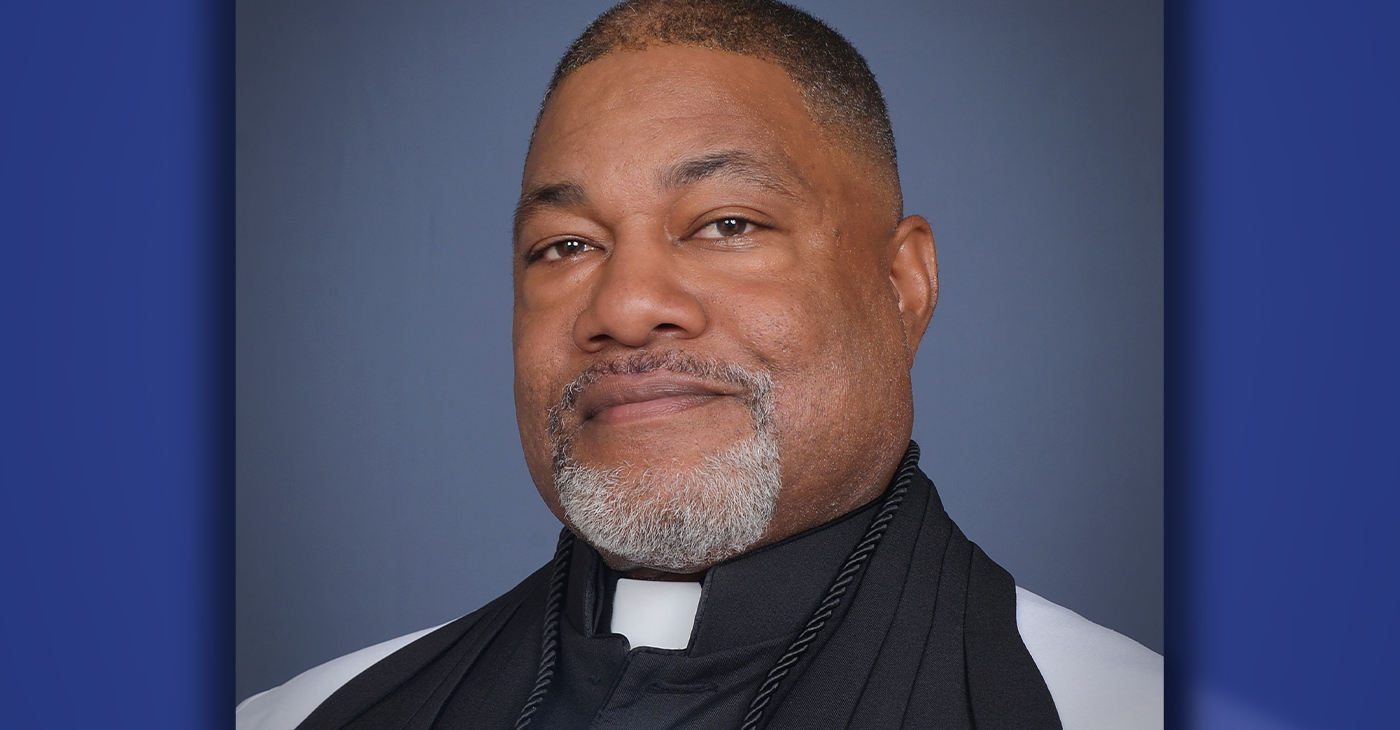
By Pamela Carter
When Jesus sent out his twelve disciples to minister the gospel he told them how they should conduct themselves as kingdom servants (Matt. 10:5–15). But he also spoke of the responsibility of the people to receive these ministers as his official representatives. Jesus insists that the way people receive his ministers reflects their relationship with God (Matt. 10:40). He invites God’s people to welcome “a prophet in the name of a prophet” and “to receive a righteous man’s reward” (v. 41).
The Faith Tabernacle A.O.H. Church of God in Richmond announced last week that it is honored to welcome Assistant Overseer Edmund A. Singleton II as our new Pastor and to introduce him to the Richmond community.
At the 108th A.O.H National Pentecostal services on June 10, 2024, Asst. Overseer Singleton was appointed Pastor of the Faith Tabernacle A.O.H. Church by the National Presider, Bishop Lawrence Williams.
His official installation services will be on Oct. 19, 2024, at 6 p.m. PT. Pastor Singleton will be the 3rd Shepard appointed to this ministry over its 69-years of existence.
Singleton, originally united with the Faith Tabernacle church in 1993, under the leadership of Bishop George and Elder Verley Ayers. He served diligently on various ministries, including Youth Department, Deacons, Ushers, an the Choir.
In 2001, the Lord called him to the ecclesiastic ministry. He began his studies and tutelage to receive his Reverend licenses in 2003. At the request of Bishop Ayers, he studied and passed his Elder’s exam and was ordained an Elder at the 90th Pentecostal meeting in 2006. In 2021, he was elevated to Assistant Overseer of the Western Region Diocese by Bishop Lawrence Williams.
In 2020, Pastor Singleton founded the Jehu Unchained Podcast, a Christian show to help individuals discover who God is and the benefits of being a born-again believer. His listenership continues to grow and has spread worldwide. In 2021, he launched the Jehu Unchained non-profit organization, geared to encouraging and supporting the youth in our community.
Pastor Singleton is a native of Oakland and a graduate of Kennedy High School in Richmond. He attended Contra Costa college and has worked in the construction industry for over 30-years.
Pastor Singleton is blessed to be married to his wife, Sister Kristie Palmer, for 27 years. They have two children, Edmund, III and Kayla.
As a husband and father, he brings a bit of wisdom, a sense of humor and a love for God’s people. He as a passion for the youth and witnessing the transformation of souls by the power of God.
#NNPA BlackPress
COMMENTARY: Prayer is Your Power
Terrible things happen to good people often. We live in an unjust world with people making decisions that are informed more by profit than people. We cannot take those principles into our relationship with God. We must believe that “… all things work together for good to them that love God, to them who are the called according to His purpose.”
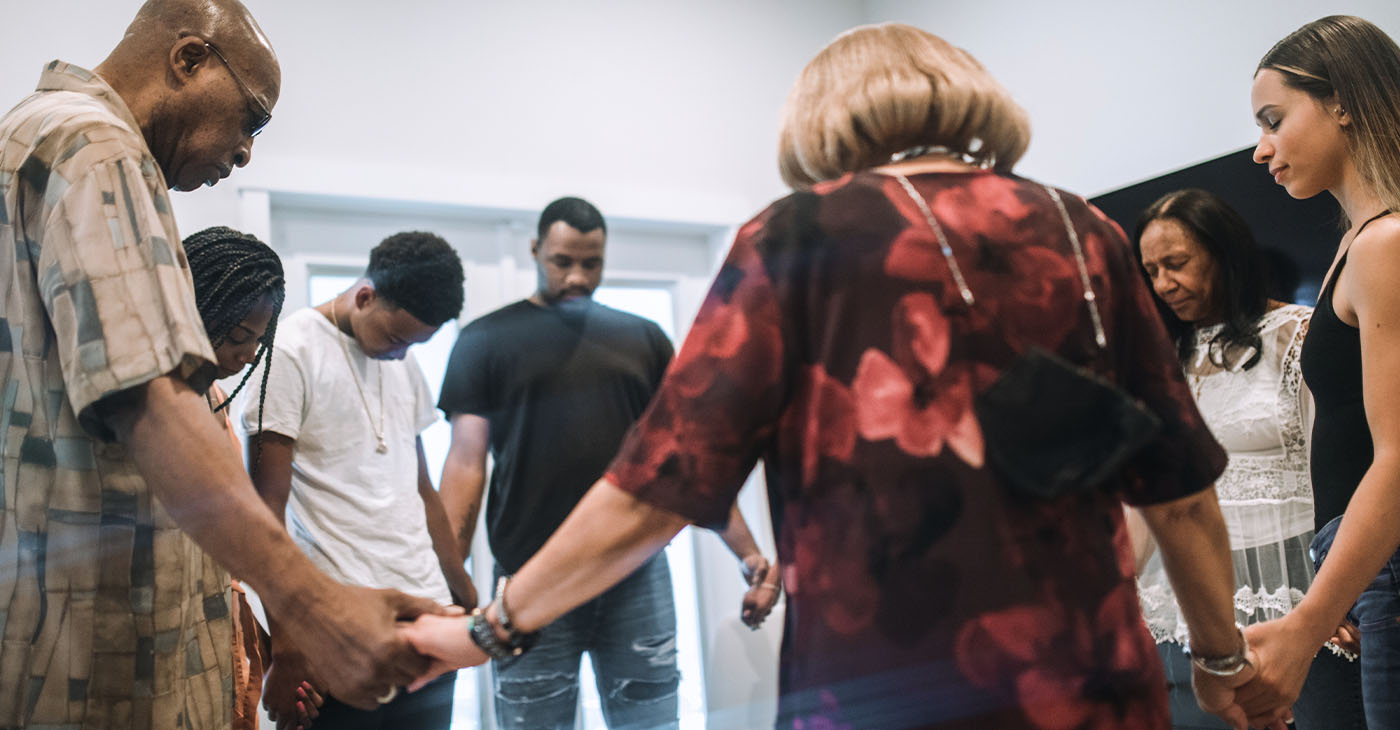
Faithful Utterances
By Dr. Froswa Booker-Drew | Texas Metro News
This week, a friend informed me that she was following the ambulance to the hospital with her husband. Her husband was going through a major health crisis. She wasn’t the only one who reached out—a friend’s mother had unexplained pain and another friend contacted me about her friend’s son who was hospitalized with pneumonia. Each of them asked that I pray for them.
I consider it an honor to pray for others. Prayer is powerful and I love that I have a group of friends who I can turn to that I call the “prayer warriors” that when I send a text to lift up the concerns and issues of others before God, they go into battle mode.
Prayer is a weapon and I think many of us don’t understand its power until we need it. For many of us, it’s a routine, something that’s more about religion than it is about relationship. We have gotten prayer twisted as some exchange solely for stuff. God is not a celestial Santa Claus dropping off gifts. Prayer is an opportunity to go before to God sincerely in relationship. “And when you pray, you must not be like the hypocrites. For they love to stand and pray in the synagogues and at the street corners, that they may be seen by others.
Truly, I say to you, they have received their reward. But when you pray, go into your room and shut the door and pray to your Father who is in secret. And your Father who sees in secret will reward you. And when you pray, do not heap up empty phrases as the Gentiles do, for they think that they will be heard for their many words. Do not be like them, for your Father knows what you need before you ask Him.” (Matthew 6:5–8)
Prayer is about faith. It is believing that God hears us. “Let us then with confidence draw near to the throne of grace, that we may receive mercy and find grace to help in time of need.” (Hebrews 4:16) I realize that my prayers are even more powerful when I am in relationship with others seeking God: “For where two or three are gathered in my name, I am there among them” (Matthew 18:20). It’s dangerous when we see prayer as a way to manipulate God into doing what we want. There is nothing wrong with bringing your requests before God but it’s important to check our motivation and intention. It’s also important to know that just because God doesn’t answer our prayers in the way that we want does not mean that God doesn’t love us.
It doesn’t mean that God does not hear us. It does not negate the omnipotence or goodness of God, either. We must believe that God is able. “And without faith it is impossible to please God, because anyone who comes to him must believe that He exists and that He rewards those who earnestly seek him.” (Hebrews 11:6) It’s easy to blame God when things don’t go the way we want them to—”the rain falls on the just and the unjust” (Matthew 5:45).
Terrible things happen to good people often. We live in an unjust world with people making decisions that are informed more by profit than people. We cannot take those principles into our relationship with God. We must believe that “… all things work together for good to them that love God, to them who are the called according to His purpose.” (Romans 8:28) …. God is concerned with our hearts, with people and cares for us even when things don’t go the way we’d like. I can report that all of the individuals we prayed for had excellent results.
God is good! Yet, I realize that this isn’t always the case. Prayer is powerful. God wants us to have this daily form of communication. 1 John 5:14, tells us: “And this is the boldness we have in Him, that if we ask anything according to His will, He hears us.” Don’t use prayer just when you need something. Just as all relationships require consistent communication for growth and results, the same is even more important in our relationship with God. Prayer is a powerful partnership with God that can move mountains when we believe!
Dr. Froswa’ Booker-Drew is the host of the Tapestry Podcast and the author of three books for women. She is also the Vice President of Community Affairs for the State Fair of Texas. To learn more, visit drfroswa.com.
Black History
AFRICAN-ISH: The First Christmas Story
Both Joseph and Mary were of the lineage of David, Joseph descended from David’s son Solomon (and Bathsheba), and Mary extended from another son Nathan. Therefore, they were required to go to the little town of Bethlehem, in Judea and there, in a cattle shed Jesus was born. (Bethlehem is 70 miles south of Nazareth and 5 miles southwest of Jerusalem).

By Simon Burris
The narrative of Jesus’ birth and proof of his Hamitic (Black) African bloodline* began in the Old Testament in the book of Genesis chapter 10, in the Land of Ham, located in southwest Asia and Africa. Three most prominent Hamitic personalities: Abraham, Isaiah and David.
People and places of Hamitic origins are underlined.
(1) Abraham the patriarch was Babylonian (Ethnic Ethiopian). Gen. 11:31; (2) Isaiah a prophet lived 750 years before Christ, predicted the virgin birth was a nephew of Amaziah a Judahite (Canaanite) king; and (3) David the great king of Israel was a descendant of Abraham, also of Tamar and Rahab (Canaanites).
The (Hamitic) Genealogy of Jesus Christ: Matthew 1:1-17; Luke 3:23-34
The Birth of Jesus: (about 6-4 BC)
Mary the virgin mother of Jesus and her husband Joseph the “foster” father of Jesus, a carpenter, lived in Nazareth, a town in northern Palestine.
At this time Emperor Augustus of the Roman Empire decreed that a census would be taken. Everyone in his domain had to go to his or her hometown to register. He probably ordered Cyrenius ( Quirinius ) the Afro Roman governor of Syria / Judeadistrict to take charge and supervise the mandate.
Both Joseph and Mary were of the lineage of David, Joseph descended from David’s son Solomon (and Bathsheba), and Mary extended from another son Nathan. Therefore, they were required to go to the little town of Bethlehem, in Judea and there, in a cattle shed Jesus was born. (Bethlehem is 70 miles south of Nazareth and 5 miles southwest of Jerusalem).
A short time later shepherds from the countryside as well as Wise Men (Magi) from neighboring countries Arabia, Babylonia,and Persia traveled to the nativity site, paid homage and worshiped the infant-Savior.
Now Joseph was warned by the Lord in a dream that Herod the Edomite king of Judea was plotting the murder of the child, fled with his family to Egypt, returning to Nazareth after the death of Herod.
Jesus had siblings, brothers Joseph, Simon, Epistle writers James, Jude, and several sisters. The last mention of Joseph occurs in the Gospel of Luke when he and Mary take the 12-year-old Jesus to Jerusalem. Mary played a vital role all through Jesus’ life, from the day He was born till the time of the crucifixion.
Conclusion: The four Gospels: Matthew, Mark, Luke and John chronicled the full theme of Christ as the universal Savior. *Descendants of Ham’s sons Cush (Ethiopia), Mizraim (Egypt), Put (Libya) and Canaan (Ancient Palestine/Israel). Genesis 10: 6-20
Footnotes: Why is Christmas celebrated on December 25?
The ancient Romans celebrated the winter solstice on December 25 as the birthday of the SUN; the Babylonians and Persians -SON of the SUN. Some 300 plus years after Jesus’ earthly demise, Roman Emperor Constantine in 336 legalized this date as the birthday of the SON of GOD – JESUS the CHRIST! Originally: Christ’s Mass.
Eurocentric racism: Pope Julius II in 1508 commissioned Michelangelo, Raphael and other Renaissance artists and church scholars to portray and depict almost all major biblical characters as Europeans (Caucasians), save servants and slaves.
-

 Activism4 weeks ago
Activism4 weeks agoOakland Post Endorses Barbara Lee
-

 Activism4 weeks ago
Activism4 weeks agoOakland Post: Week of March 28 – April 1, 2025
-

 Activism3 weeks ago
Activism3 weeks agoOakland Post: Week of April 2 – 8, 2025
-

 #NNPA BlackPress3 weeks ago
#NNPA BlackPress3 weeks agoTrump Profits, Black America Pays the Price
-

 Activism2 weeks ago
Activism2 weeks agoOakland Post: Week of April 9 – 15, 2025
-

 #NNPA BlackPress3 weeks ago
#NNPA BlackPress3 weeks agoHarriet Tubman Scrubbed; DEI Dismantled
-

 #NNPA BlackPress3 weeks ago
#NNPA BlackPress3 weeks agoTrump Targets a Slavery Removal from the National Museum of African-American History and Culture
-

 #NNPA BlackPress3 weeks ago
#NNPA BlackPress3 weeks agoLawmakers Greenlight Reparations Study for Descendants of Enslaved Marylanders

